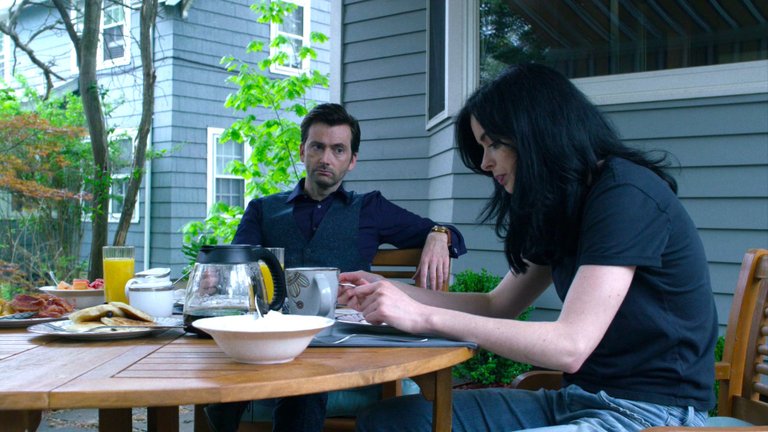Television Review: Jessica Jones (Season 1, 2015)
![(source:tmdb.org)] ()
()
The Marvel Cinematic Universe in the 2010s has grown so vast that it was no longer confined to film alone; Marvel Comics could afford to adapt even relatively obscure titles. Jessica Jones served as one such example, her obscurity explained not only by her unconventional status as a Marvel superheroine but also by her relative youth. She made her first comic appearance in 2001, which may not seem so distant given that the initial foundations for what would become a lucrative enterprise for Marvel and Hollywood studios were already laid thanks to the first X-Men films. Less than a decade and a half later, Jessica Jones re-emerged as the protagonist of a Netflix television series that garnered significant critical acclaim—not only among the now extensive array of superhero series but also within today’s hyper-competitive landscape of live-action television shows.
Jessica Jones, which, like other Netflix series, adopted the now-popular “limited” 13-episode format with a self-contained narrative per season, belongs to the same Marvel universe as The Avengers. In a narrower sense, it is even more closely linked to Daredevil, which preceded it, as well as Luke Cage and Iron Fist, which followed. The titular protagonist, portrayed by Krysten Ritter, is a New York-based private detective who, despite possessing superhuman strength, takes on routine, poorly paid jobs for decidedly unglamorous clients and spends nearly all her free time in a third-rate, run-down apartment where her neighbours are junkies and various pathological cases. Jones herself is not far removed from them, as her only companion—aside from the popular radio host Trish Walker (Rachael Taylor), whom she has known since childhood—is a bottle of whisky.
The reasons for her attempts to drown her sorrows in alcohol stem not only from her previous career as a costumed heroine ending in catastrophic failure but also from an incident that left her deeply traumatised and consumed by guilt. Behind it all stands the villain Killgrave (David Tennant), who possesses the power to control others’ minds and whom she confronts again when it emerges that the runaway daughter her clients are searching for is one of his latest victims.
Jessica Jones, much like Daredevil, represents both a part of and a kind of antithesis to the Marvel Cinematic Universe—at least if one considers its most famous elements to be costumed superheroes spectacularly saving megacities from alien monsters. The series’ heroine is far more grounded in reality, or as close to a realistic depiction of everyday life as the superhero genre permits. She is not merely a sullen cynic, alcoholic, and PTSD sufferer but also exists in a world weighed down by supposedly “trivial” and “banal” yet very real issues such as addiction and sexual abuse. Even the main antagonist, masterfully portrayed by David Tennant, is relatively “small-time” compared to other Marvel villains, using his powers to indulge in seemingly minor whims. It is precisely the banality and everyday nature of his evil that makes him far more terrifying. The series’ exceptionally dark, noir tone—where there was little opportunity to utilise special effects—is also reflected in the sex scene involving the protagonist, which in the original comic was notably bold for Marvel’s standards at the time due to its rawness but in the series is reconstructed faithfully in a decidedly non-erotic manner.
However, the atmosphere alone would not have been sufficient for Jessica Jones’ success without the exceptionally high-quality scriptwriting. Melissa Rosenberg, known for her work on the Twilight film series and the popular TV show Dexter, adeptly handled the material, delivering viewers a dark yet intriguing and gripping story across 13 episodes. She was strongly supported by a cast dominated by women, unlike many series in the same genre. This applies above all to Ritter, who, by portraying a far more complex character than the ill-fated Jane Margolis in Breaking Bad, is crafting one of the most unconventional, least conventional, yet most striking television heroines in recent years. Australian model Rachael Taylor also delivered a strong performance as her friend, as did Carrie-Anne Moss, who has quietly transitioned to character-driven roles since The Matrix and here portrays a deeply compelling, morally compromised lesbian lawyer. Jessica Jones, at least judging by its first season, is a series that once again demonstrates how television, even within the superhero genre, has become a higher-quality medium than the big screen in terms of content quality.
RATING: 8/10 (+++)
(Note: The text in the original Croatian version is available here.)
Blog in Croatian https://draxblog.com
Blog in English https://draxreview.wordpress.com/
InLeo blog https://inleo.io/@drax.leo
LeoDex: https://leodex.io/?ref=drax
Hiveonboard: https://hiveonboard.com?ref=drax
InLeo: https://inleo.io/signup?referral=drax.leo
Rising Star game: https://www.risingstargame.com?referrer=drax
1Inch: https://1inch.exchange/#/r/0x83823d8CCB74F828148258BB4457642124b1328e
BTC donations: 1EWxiMiP6iiG9rger3NuUSd6HByaxQWafG
ETH donations: 0xB305F144323b99e6f8b1d66f5D7DE78B498C32A7
BCH donations: qpvxw0jax79lhmvlgcldkzpqanf03r9cjv8y6gtmk9
Congratulations @drax! You received a personal badge!
You can view your badges on your board and compare yourself to others in the Ranking